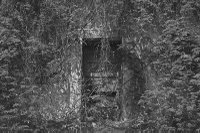- Dino Buzzati (1906 - 1972)
The Tartar Steppe
The passage above is taken from a novel of one of my favorite authors. Buzzati was trained as a journalist, but channeled his creative energies into creating a magical-realist-like (Kafkaesque, even Borgesian) surrealist world of fantasy just on the cusp of seeming "real." The Tartar Steppe is arguably his best known work. The "hero" of the story, Giovanni Drogo, is stationed at a fort in the desert that overlooks the vast Tartar steppe and told to await an invasion; one which, as we learn over the course of the novel, never actually comes. Among other things (e.g., a scathing rebuke of military life) it is a Camus-like Sisyphisian meditation on time, life, the specter of lost opportunities, and the perpetual - unquenchable - thirst for fulfilment. But, while all of these elements are fascinating on their own (and should prompt anyone with a penchant for Kafka and Borges who has not yet experienced Buzatti's writing to become acquainted with his work), I was reminded of another element of this allegorical tale while driving with my family around Iceland. Namely, its subtle depiction of the immeasurable boundlessness - the infinity - of space and and time.
Iceland is a curiously dynamic blend of physical, aesthetic, and spiritual contrasts that never do more than only hint at some unfathomable underlying "reality." Iceland's vast stretches of land and sea can be used as backdrops to Drogo's endless wait for something to happen. Seemingly infinite blocks of solidified magma and melting glaciers are omnipresent on the horizon; approachable, in principle (by inquisitive souls willing to risk flat tires or broken axles - or both - while traversing the unpaved roads trying to get to them) but perpetually just-out-of-reach. Measures of time and distance both loose conventional - indeed, any - meaning. Just as the Apollo astronauts had difficulty judging how far rocks and mountains were from them on the moon (in the moon's case, because of the lack of an atmosphere), my family and I often struggled to estimate how "near" or "far" anything was; or how "long" or "short" a time it would take to get somewhere. In our case, this was due not to a lack of an atmosphere (the ever-churning transitions from clear skies to moody clouds to thick unrelenting globs of wind and rain to clear skies again were constant reminders of Iceland's dramatic weather; unlike in Buzatti's novel - in Iceland things emphatically do happen!), but simply to how alien Iceland's landscape is compared to our calibrated norms. Everything In Iceland seems to be simultaneously so close as give the illusion of intimacy, and yet so remotely far, so incomprehensibly and immeasurably distant, as to be unapproachable, at least within a single lifetime (or, at least, during a single trip 😊







